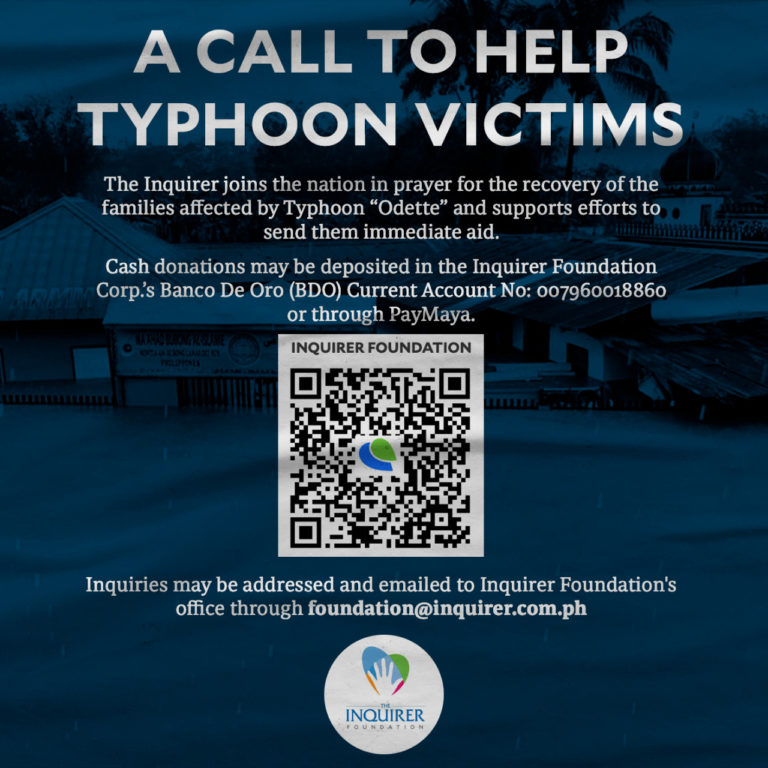Ceasefire, please
Omicron. Odette. Christmas. New Year. Election season. Still no ceasefire on the local communist armed conflict front. What does it have to take for a ceasefire to happen between the government and the rebels? What more humanitarian considerations are needed? As Bob Dylan put it, “How many deaths will it take ’til [we] know, that too many people have died?”
The answer, lamented Dylan, is “blowin’ in the wind”—and the last mighty wind was Supertyphoon “Odette,” just one more of the many natural and man-made calamities heading our way.
In March 2020, early in the pandemic, UN Secretary-General António Guterres called for a global ceasefire in armed conflicts around the world, which he reminded was facing a common existential enemy in COVID-19. “The fury of the virus illustrates the folly of war,” he said. “It is time to put armed conflict on lockdown and focus together on the true fight of our lives … Pull back from hostilities. Put aside mistrust and animosity. Silence the guns, stop the artillery, end the airstrikes … This is crucial—to help create corridors for life-saving aid. To open precious windows for diplomacy. To bring hope to places among the most vulnerable to COVID-19 … End the sickness of war and fight the disease that is ravaging our world. It starts by stopping the fighting everywhere.” In another speech, he said: “There should be only one fight in our world today, our shared battle against COVID-19.”
After Odette, and with our country observing this traditionally most joyous season of grace and giving, and in the build-up to what is expected to be a most hotly contested election particularly at the presidential level, can we not consider the wisdom and sanity of the UN Secretary-General’s ceasefire call? Imagine the combined resources and energies of the Armed Forces of the Philippines and Philippine National Police and the New People’s Army (NPA) diverted and put to better use on cooperative or parallel efforts in public health, especially in the areas of vaccination and typhoon relief and rehabilitation particularly in far-flung and isolated areas, including those in NPA guerrilla zones. Aren’t NPA guerrillas also part of the Filipino people who ought to be vaccinated in the best interest of our people and our country? The principle involved here is to ensure that no one is left behind, because as the World Health Organization has warned, “no one is safe until everyone is safe.”
It takes two to do this tango; selfie TikTok dancing simply will not do. So, who has the better Christmas spirit? Who can show us by declaring a ceasefire not only for the Christmas season, but as a humanitarian anti-COVID-19 and typhoon relief initiative as well? Even a unilateral announcement, if it has to be, is welcome. This may seem like a small matter compared to the oft-repeated big picture cause of “addressing the root causes of armed conflict” or the grand narrative of “national and social liberation.” But any respite from the crossfire is a life-and-death matter for our rural folk in the countryside. For the armed protagonists, a ceasefire may also serve as a crucial opportunity to build much-needed trust and confidence-building to foster a less hostile climate between them. Who knows, peace negotiations may eventually be able to resume from such goodwill gestures. The coming presidential elections are particularly crucial for the resumption of peace talks, which will best prosper when accompanied by an honest-to-goodness ceasefire.
The “little steps” of a ceasefire and humanitarian cooperation, where possible, should pave the way for the big step of renewed peace talks and the ultimate objective: a negotiated political settlement. To quote another music artist—Michael Jackson this time: “We may not change the world in one day, but we still can change some things today, in our small way.” How about it, guys?
——————
Soliman M. Santos, Jr. is a long-time human rights and IHL (international humanitarian law) lawyer; legislative consultant and legal scholar; peace advocate, researcher, and writer; author of a number of books; founding and long-time coordinator, now chair emeritus, of the Philippine Campaign to Ban Landmines; and a member of the new editorial board of the International Review of the Red Cross. The views here are his own.
For more news about the novel coronavirus click here.
What you need to know about Coronavirus.
For more information on COVID-19, call the DOH Hotline: (02) 86517800 local 1149/1150.
The Inquirer Foundation supports our healthcare frontliners and is still accepting cash donations to be deposited at Banco de Oro (BDO) current account #007960018860 or donate through PayMaya using this link.

















